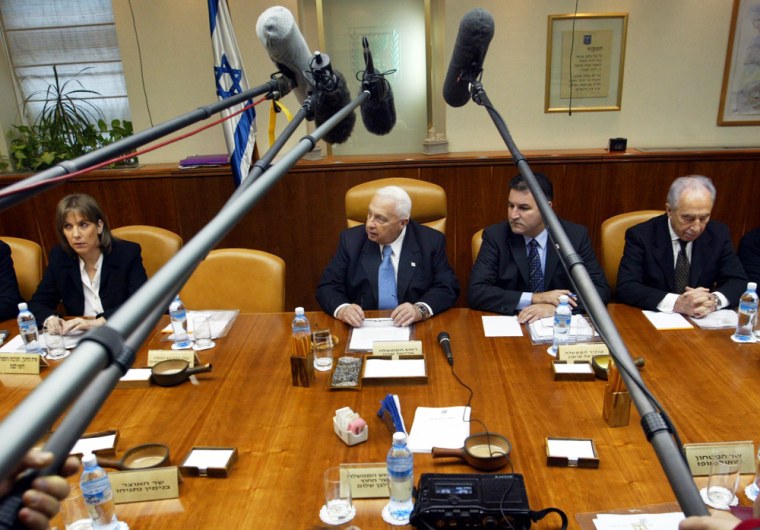Prime Minister Ariel Sharon’s Cabinet began charting Israel’s future borders in a historic session Sunday, giving final approval to a withdrawal from the Gaza Strip and a revised route for the West Bank separation barrier that would move Israel’s border closer to that of its original frontier.
With the vote, an Israeli government agreed for the first time since capturing the West Bank and Gaza in the 1967 Mideast war to dismantle some of the dozens of Jewish settlements it has built there. However, approving the route of the barrier, Israel acted unilaterally on what was to be a key issue in peace talks with the Palestinians, and signaled it will keep a chunk of prime West Bank land close to Jerusalem, including two large Jewish settlement blocs.
While the Palestinians have balked at Israel’s go-it-alone approach, they avoided declaring the moves a deal-breaker in a peace process reinvigorated since the Nov. 11 death of Palestinian leader Yasser Arafat and subsequent election of Mahmoud Abbas to replace him.
“Israel is creating facts on the ground in the West Bank,” Palestinian legislator Hanan Ashrawi said. “Sharon wants payback in the West Bank for the disengagement from Gaza, particularly Jerusalem.”
New Palestininian cabinet
Separately, lawmakers from the ruling Fatah Party approved a new Palestinian Cabinet early Monday, party officials said, clearing the way for Abbas to present the lineup to the parliament for a vote of confidence later in the day.
The Gaza withdrawal won approval from 17 Cabinet ministers, including eight from the moderate Labor Party, while five ministers from Sharon’s ruling Likud Party voted against it.
Sharon, a former settler patron, said the dismantling of 21 settlements in Gaza and four in the West Bank is vital for Israel’s security. He later signed an order requiring some 9,000 settlers to leave their homes in these areas by July 20 or face removal by force.
“Israel has taken a step that will be decisive for its future ... the right one to ensure Israel’s future as a Jewish and democratic state,” he told American Jewish leaders in Jerusalem. He said the vote proved Israel’s readiness to take “painful steps ... to make peace.”
The endorsement appeared to be the final political defeat for withdrawal opponents, including the powerful Jewish settler lobby. The pullout could still be derailed if Sharon fails to get his 2005 budget passed by parliament by the end of March.
“This is a historic decision, but we are facing a very difficult period,” Justice Minister Tzipi Livni said of expected settler confrontations with troops.
Pinchas Wallerstein, a leader of the council of Jewish settlements, called on supporters to begin “an aggressive and strong struggle,” but to avoid violent confrontations with Israeli troops.
The militant Hamas group claimed victory, with its Gaza spokesman Musher al-Masri calling the Israeli pullout “a result of the heroic resistance of our people.”
Defense Minister Shaul Mofaz told the Cabinet thousands of troops would take part in dismantling the settlements in a four-stage withdrawal. The Cabinet has not decided in which order the settlements will be removed.
In an equally momentous vote, Cabinet ministers approved the final route of the separation barrier, encompassing more than 6 percent of West Bank land, including the large Jewish settlement blocs of Gush Etzion and Maaleh Adumim, both near Jerusalem. The barrier’s new route runs 370 miles, Israel Radio reported.
One-third complete
Construction of the West Bank barrier began in 2002 and is one-third complete. Israel said it needed a shield against Palestinian suicide bombers and gunmen. The Palestinians denounced the barrier as a land grab, saying Israel could have built it on its land. Last year, the world court said in a nonbinding opinion that the construction of the barrier is illegal and should stop.
The route originally proposed by army planners would have sliced off nearly one-fifth of the West Bank, but large segments were struck down by Israel’s Supreme Court as causing too much hardship for Palestinians.
By a vote of 20-1 with one abstention, the Cabinet approved a revised path closer to Israel’s pre-1967 boundary with the West Bank. But in the Jerusalem area the new route dips deep into the West Bank, a path that could undercut the Palestinians’ attempt to establish their future capital in the eastern sector of the city, abutting the West Bank.
Several Cabinet ministers acknowledged that while the barrier would help determine final borders. “The route of the fence is significant in terms of future negotiations over Israel’s borders,” Livni said.
The Palestinian leader told the German news magazine Der Spiegel that Israel must dismantle all settlements and halt construction of the barrier.
Sharon has said he has U.S. blessing for holding on to large West Bank settlement blocs in a future peace deal. Last year, President Bush affirmed to Sharon in a letter that “new realities” in the West Bank, meaning concentrations of Israeli settlers, could not be overlooked in drawing future borders.
“The American letter to Sharon is unacceptable because it pre-empts solutions for a final phase we haven’t reached yet,” Abbas told Der Spiegel, saying Bush cannot determine the Palestinians’ fate.
Most prominent among the new faces in the 24-member Palestinian Cabinet was Nasser Yousef, who becomes interior minister in charge of security forces. Arafat had resisted appointing Yousef, an ex-general, preferring to keep control of the forces. Yousef replaces Arafat crony Hakam Bilawi in the post.
Nasser al-Qidwa, Arafat’s nephew, who has been serving as the Palestinian representative at the United Nations, was to take over as foreign minister, replacing Nabil Shaath, who becomes deputy prime minister.
In other developments:
- Israel announced it would free 500 prisoners on Monday, in accordance with agreements reached at an Israeli-Palestinian summit earlier this month.
- Israeli troops killed one Palestinian and wounded another on suspicion they tried to smuggle arms from Egypt to Gaza. A third man was arrested for interrogation, the army said.
